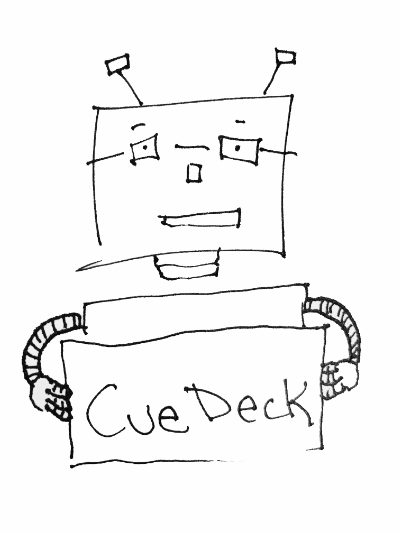About CueDeck

While there are a lot of flashcard apps, I had a hard time finding one I really loved (see 'what makes a good flashcard app').
Thus was born CueDeck. This app is free to use.
My name is Ben Parzybok. I'm a novelist and programmer.
If you like CueDeck feel free to buy me a beer.
See a few of my other projects:
- Levin of Earth - my own website, which has a biography-revealing game built into it.
- Universal Deck - a tool to create a 'personal universal deck', a writing exercise / divination tool created by the poet Michael McClure.
- Marginalist - an iOS app for readers and editors of manuscripts.
- My novels Couch and Sherwood Nation
Change log
- 2025-07-23: Upload a CSV file to create a deck!
- 2024-03-30: Cleaned up all cards/sorting page.
- 2024-03-22: New: added 'last card' to view previous card, as well as stat tracking cards viewed.
- 2023-05-27: security and framework updates.
- 2021-01-16: Added support for downloading your cards as a CSV/spreadsheet file.
- 2020-01-09: Added support for reversing card/definition while cueing. Thanks Lisa Hoashi!
- 2020-01-02: Support for long-text cards, privacy policy, bug fixes. Purchased domain: cuedeck.app Thanks Roy Moulton for QA!
- 2020-01-01: Daily card - receive a card by text message daily.
- 2019-06-01: Nightly card - receive a card by email every evening.
- 2019-05-01: App launch!
What makes a good flashcard app, a tiny manifesto
- The tech should get out of your way. It should be keyboard controlled and fast. Memorizing is hard enough already, you shouldn't be subjected to ads and other crud that draws your attention away. It should work equally well on mobile web or desktop.
- You should be able to indicate how well you know a word, so that cards can be sorted/viewed by your relative understanding level.
- It shouldn't let you lapse. It should send you cards, and thus remind you to keep at it.
- You should be able to take your data with you.
I set out to address these things when I built CueDeck.app. I use 'Daily Card' and 'Nightly Card' to send the same vocabulary word twice per day, through two different methods. The first via text message, the second by email, separated by 8 hours.
I find that this 2-step process, with a digestion window in between, is vital for memorization.
Finally: I do not have 'installable' decks, or deck sharing. I believe that entering your cards in the first place is vital to the memorization process, and I highly encourage you to do so.
I have added CSV imports! You can now add all your words at once. Yes, I still believe the above is true, but sometimes it's better to just get the cards in and start flashing.
(That said, you're welcome to tell me I'm wrong 😉. My contact info is here.)